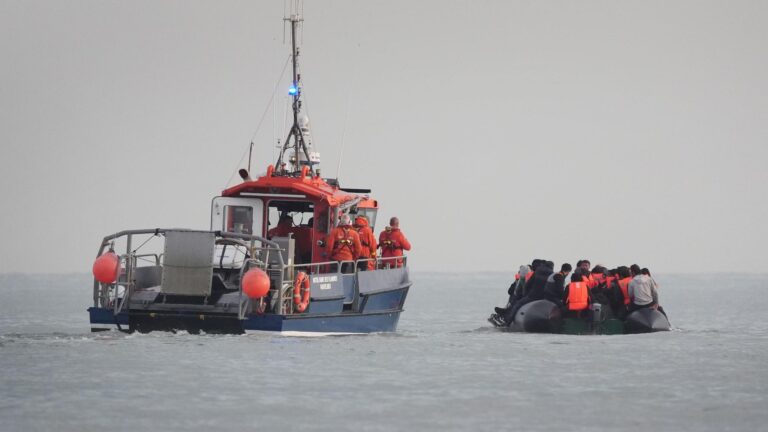The United Kingdom and France have reached a mutual understanding on the necessity of implementing a new deterrent aimed at curbing the increasing number of migrants attempting to cross the English Channel by boat. The agreement, announced amid rising concerns over hazardous crossings and the associated political tensions, underscores both countries’ commitment to enhancing security measures and managing migration flows more effectively. This development highlights ongoing efforts to address one of the most contentious issues in UK-France relations in recent years.
UK and France Commit to Enhanced Border Security Measures along Channel
The United Kingdom and France have reached an agreement to deploy reinforced border security provisions aimed at curbing the escalating number of migrant crossings through the Channel. Both governments emphasize the urgency of introducing a robust deterrent to tackle the dangerous and illegal boat journeys undertaken by migrants. The initiative includes ramped-up surveillance, enhanced maritime patrols, and improved intelligence sharing targeting human trafficking networks operating on both sides of the Channel.
Key components of the new measures include:
- Joint patrols: Coordinated operations combining UK and French coast guard units to monitor high-risk areas.
- Technological upgrades: Utilization of drones and radar systems to detect and intercept unauthorized vessels early.
- Legal frameworks: Streamlined protocols for rapid processing and return of intercepted migrants to discourage repeated attempts.
These actions aim to not only reduce the perilous passage attempts but also dismantle the networks exploiting vulnerable migrants. Officials from both countries have expressed commitment to sustained collaboration, acknowledging that only a united approach will effectively address this complex humanitarian and security challenge.
| Security Measure | Primary Objective | Expected Deployment |
|---|---|---|
| Increased Maritime Patrols | Early action and rapid interception | Immediate |
| Advanced Surveillance Tech | Enhanced vessel detection | Within 3 months |
| Strengthened Legal Coordination | Faster repatriation processes | Ongoing |
Joint Strategies Target Smuggling Networks Behind Migration Surge
In a bold move to counter the increasing number of perilous Channel crossings, UK and French officials have intensified cooperation to dismantle the smuggling networks orchestrating the dangerous migration surge. Both governments emphasized the urgent need to introduce a new, effective deterrent that targets the root of the crisis: the criminal gangs profiting from migrants’ desperation. Enhanced intelligence sharing, joint patrols, and coordinated law enforcement actions mark the initial phase of this strategic alliance, aiming to disrupt these illicit operations on multiple fronts.
Key components of the joint strategy include:
- Expanded maritime surveillance incorporating advanced drone technology
- Increased deployment of rapid response units along vulnerable coastal areas
- Strengthened penalties for convicted human traffickers
- Cross-channel coordination to intercept smuggling shipments before reaching ports
| Measure | Objective | Expected Impact |
|---|---|---|
| Drone Surveillance | Real-time monitoring | Early detection of smuggling boats |
| Joint Patrols | Heightened presence | Rapid interception capacity |
| Legal Reforms | Harsher sentences | Disrupt smuggler incentives |
Calls for Investment in Safe and Legal Migration Pathways Intensify
As tensions escalate over perilous Channel crossings, advocacy groups and international organizations are amplifying demands for sustainable, safe migration options. The recent accord between the UK and France to develop new deterrents against illegal boat crossings has reignited debates around the urgent need for structured, legal pathways to migration. Experts argue that without robust alternatives, the flow of migrants seeking refuge and opportunity will continue unchecked, often risking their lives in dangerous waters.
Among the proposed solutions, calls emphasize:
- Expansion of humanitarian visa programs that allow vulnerable individuals to apply safely before attempting risky journeys.
- Investment in resettlement schemes designed to share responsibility across Europe and reduce pressure on frontline countries.
- The establishment of streamlined asylum processing centers aimed at improving efficiency and transparency in handling claims.
| Key Proposal | Description | Expected Impact |
|---|---|---|
| Humanitarian Visas | Safe pre-travel application options | Reduces dangerous crossings |
| Resettlement Programs | Shared migration responsibility | Alleviates frontline pressures |
| Asylum Processing Centers | Faster legal claim assessments | Improves system transparency |
Government Officials Emphasize Collaborative Enforcement and Humanitarian Balance
Senior officials from the United Kingdom and France have reinforced the importance of coordinated enforcement strategies to address the recurring challenges posed by illegal migration across the English Channel. Both governments underscored the need for intensified patrols, intelligence sharing, and enhanced surveillance measures that operate in tandem with humanitarian safeguards. This multifaceted approach aims to deter risky crossings while ensuring that human rights commitments are not compromised in the pursuit of border security.
Key points highlighted by officials include:
- Strengthening joint maritime operations with real-time information exchange
- Deploying additional resources to critical departure points along the coasts
- Streamlining asylum processing to reduce incentives for unsafe journeys
- Collaborating with NGOs to provide timely rescue and assistance
| Factor | Description | Priority Level |
|---|---|---|
| Joint Operations | Enhanced patrol coordination in Channel waters | High |
| Humanitarian Assistance | Quick response rescue teams and medical aid | Medium |
| Intelligence Sharing | Real-time data exchange on smuggling networks | High |
To Conclude
As the UK and France move forward with plans to establish a new deterrent against unlawful migration crossings, the agreement highlights the ongoing challenges faced by both nations in managing migration flows across the Channel. While officials emphasize the necessity of enhanced security measures to curb dangerous journeys, human rights groups caution that any approach must balance enforcement with the protection of vulnerable migrants. The coming months will be critical in shaping the implementation of this policy, as both countries seek to address a complex and contentious issue with far-reaching humanitarian and political implications.




